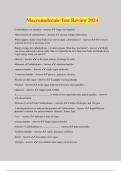Macromolecule - Study guides, Class notes & Summaries
Looking for the best study guides, study notes and summaries about Macromolecule? On this page you'll find 2124 study documents about Macromolecule.
Page 3 out of 2.124 results
Sort by
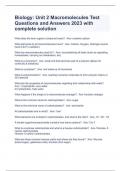
-
Macromolecules Bundled Exams with complete solutions 2023-2024 Versions
- Package deal • 9 items • 2023
-
- $20.49
- + learn more
Macromolecules Practice Test Questions and Answers 2023 with complete solution Macromolecules exam 2023 questions and answers with complete solution Biochemistry Macromolecules Questions and Answers 2023-2024 with complete solution Biochemistry Macromolecules Actual Questions and Answers 2023-2024 with complete solution
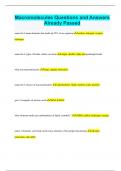
-
Macromolecules Questions and Answers Already Passed
- Exam (elaborations) • 8 pages • 2023
- Available in package deal
-
- $9.99
- + learn more
Macromolecules Questions and Answers Already Passed name the 4 main elements that make up 95% of an organism carbon, nitrogen, oxygen, hydrogen name the 4 types of bonds carbon can form single, double, triple and quadruple bonds what are macromolecules large, organic molecules name the 4 classes of macromolecules carbohydrates, lipids, nucleic acids, proteins give 2 examples of nucleic acids DNA & RNA what elements make up carbohydrates & lipids (symbol) ? (CHO) carbon, hydrogen, oxygen na...
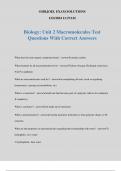
-
Biology: Unit 2 Macromolecules Test Questions With Correct Answers
- Exam (elaborations) • 19 pages • 2024
-
- $11.49
- + learn more
Biology: Unit 2 Macromolecules Test Questions With Correct Answers What does the term organic compound mean? - answercontains carbon What elements do all macromolecules have? - answerCarbon, Oxygen, Hydrogen (some have N & P in addition) What are macromolecules used for? - answeraccomplishing all tasks (such as regulating homeostasis, carrying out metabolism, etc) What is a monomer? - answersmall unit that becomes part of a polymer (allows for continuity & simplicity) What is a polymer?...
Macromolecule Bundled Exams Questions and Answers | 100% Verified and Updated 2024
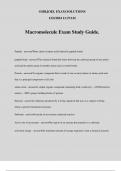
-
Macromolecule Exam Study Guide.
- Exam (elaborations) • 9 pages • 2024
-
- $10.49
- + learn more
Macromolecule Exam Study Guide. Peptide - answerShort chain of amino acids linked by peptide bonds peptide bond - answerThe chemical bond that forms between the carboxyl group of one amino acid and the amino group of another amino acid, covalent bonds Protein - answerAn organic compound that is made of one or more chains of amino acids and that is a principal component of all cells amino acids - answera simple organic compound containing both a carboxyl (—COOH) and an amino (—NH2) gro...
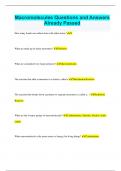
-
Macromolecules Questions and Answers Already Passed
- Exam (elaborations) • 6 pages • 2023
- Available in package deal
-
- $9.99
- + learn more
Macromolecules Questions and Answers Already Passed How many bonds can carbon form with other atoms? 4 What are made up of many monomers? Polymers What are considered very large polymers? Macromolecules The reaction that adds a monomer to a chain is called a Dehydration Reaction The reaction that breaks down a polymer to separate monomers is called a...? Hydrolysis Reaction What are the 4 major groups of macromolecules? Carbohydrates, Proteins, Nucleic Acids, Lipids What macromolecule is t...
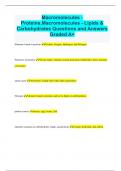
-
Macromolecules - Proteins,Macromolecules - Lipids & Carbohydrates Questions and Answers Graded A+
- Exam (elaborations) • 5 pages • 2023
- Available in package deal
-
- $8.99
- + learn more
Macromolecules - Proteins,Macromolecules - Lipids & Carbohydrates Questions and Answers Graded A+ Elements found in proteins Carbon, Oxygen, Hydrogen, and Nitrogen Functions of proteins Tissue repair, immune system protection (antibodies), basic structure of enzymes amino acids monomors (single units) that make up proteins Nitrogen element found in proteins and not in lipids or carbohydrates. protein sources meats, eggs, beans, fish elements common to carbohydrates, lipids, and proteins oxy...
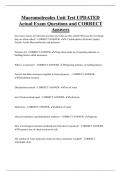
-
Macromolecules Unit Test UPDATED Actual Exam Questions and CORRECT Answers
- Exam (elaborations) • 8 pages • 2024
- Available in package deal
-
- $8.99
- + learn more
Macromolecules Unit Test UPDATED Actual Exam Questions and CORRECT Answers how many classes of molecules are there and what are they called? What are the two things they are often called? - CORRECT ANSWER- 4- Carbohydrates) Proteins) Lipids) Nucleic Acids) Macromolecules and polymers Polymer def - CORRECT ANSWER- long chain made up of repeating subunits, or building blocks called monomers.
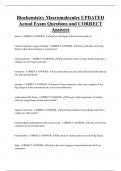
-
Biochemistry Macromolecules UPDATED Actual Exam Questions and CORRECT Answers
- Exam (elaborations) • 6 pages • 2024
- Available in package deal
-
- $7.99
- + learn more
Biochemistry Macromolecules UPDATED Actual Exam Questions and CORRECT Answers atoms - CORRECT ANSWER- what are all things in the universe made of carbon; hydrogen oxygen nitrogen - CORRECT ANSWER- what is the basis for living things? what other elements is it present in? macromolecule - CORRECT ANSWER- big molecules made of many small molecules; a category of very large molecules
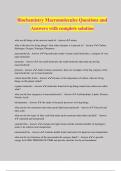
-
Biochemistry Macromolecules Questions and Answers with complete solution
- Exam (elaborations) • 4 pages • 2024
- Available in package deal
-
- $10.49
- + learn more
Biochemistry Macromolecules Questions and Answers with complete solution what are all things in the universe made of - Answer ️️ -atoms what is the basis for living things? what other elements is it present in? - Answer ️️ -Carbon; Hydrogen, Oxygen, Nitrogen, Phosporus macromolecule - Answer ️️ -big molecules made of many small molecules; a category of very large molecules monomer - Answer ️️ -one small molecule; the small molecules that make up one big macromolecule pol...

How did he do that? By selling his study resources on Stuvia. Try it yourself! Discover all about earning on Stuvia

